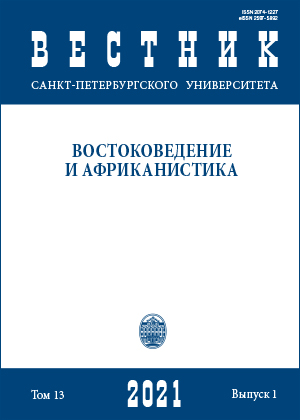The Colony of Aden in Post-Colonial Yemeni Novel
DOI:
https://doi.org/10.21638/spbu13.2021.103Abstract
In many Arab countries, where colonial rule was replaced by local authoritarian, often corrupt, regimes, popular discontent with the living conditions under the new government has produced a kind of nostalgia for the colonial past. This nostalgia is well observed in today’s Aden (Republic of Yemen), which was a British colony from 1839 until 1967. In the middle of the 20th century, Aden was the most prosperous city on the Arabian Peninsula and one of the busiest seaports in the world. This article examines how this nostalgia is manifested in modern Yemeni literature, namely in three novels: Three Midnighters (1993) by Sa‘id Awlaqi, Adeni Incense (2014) by Ali al-Muqri, and Steamer Point (2015) by Ahmad Zayn (Zein). In the novel Three Midnighters, which takes place in the late 1980s, the allegory of Aden Colony is a cultural club, whose activities are remembered by the characters. The main characteristics of that club were its openness to all people, its atmosphere of freedom of thought, freedom of expression, mutual respect of its members, prosperity, love, and fun. In Adeni Incense, Aden Colony also resembles a wonderful club. The members of this club, that is, the characters of the novel, live in harmony, love, and prosperity — until evil external forces begin to destroy this club. The lack of realistic details in the depiction of the city and its inhabitants allows the reader to perceive the novel as allegorical rather than realistic. In Steamer Point, Aden Colony does not appear as a wonderful club, since the novel is written in a completely realistic manner. Nevertheless, Aden in the novel has two important features: the economic prosperity and peaceful coexistence of representatives of different cultures and different identities. It is these features of the city that one of the main characters, a sincere admirer of the British, is afraid to lose as a result of the British withdrawal.
Keywords:
Arab novel, Yemen, Aden, Said Awlaqi, Ali al-Muqri, Ahmad Zein
Downloads
References
Downloads
Published
How to Cite
Issue
Section
License
Articles of "Vestnik of Saint Petersburg University. Asian and African Studies" are open access distributed under the terms of the License Agreement with Saint Petersburg State University, which permits to the authors unrestricted distribution and self-archiving free of charge.





